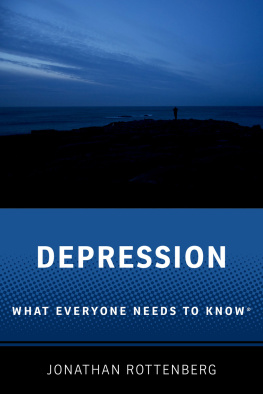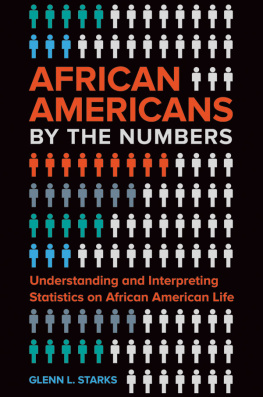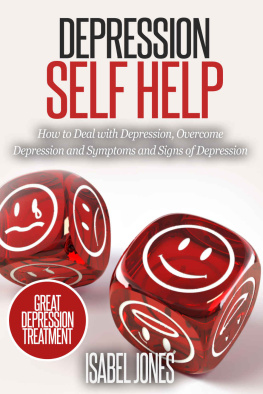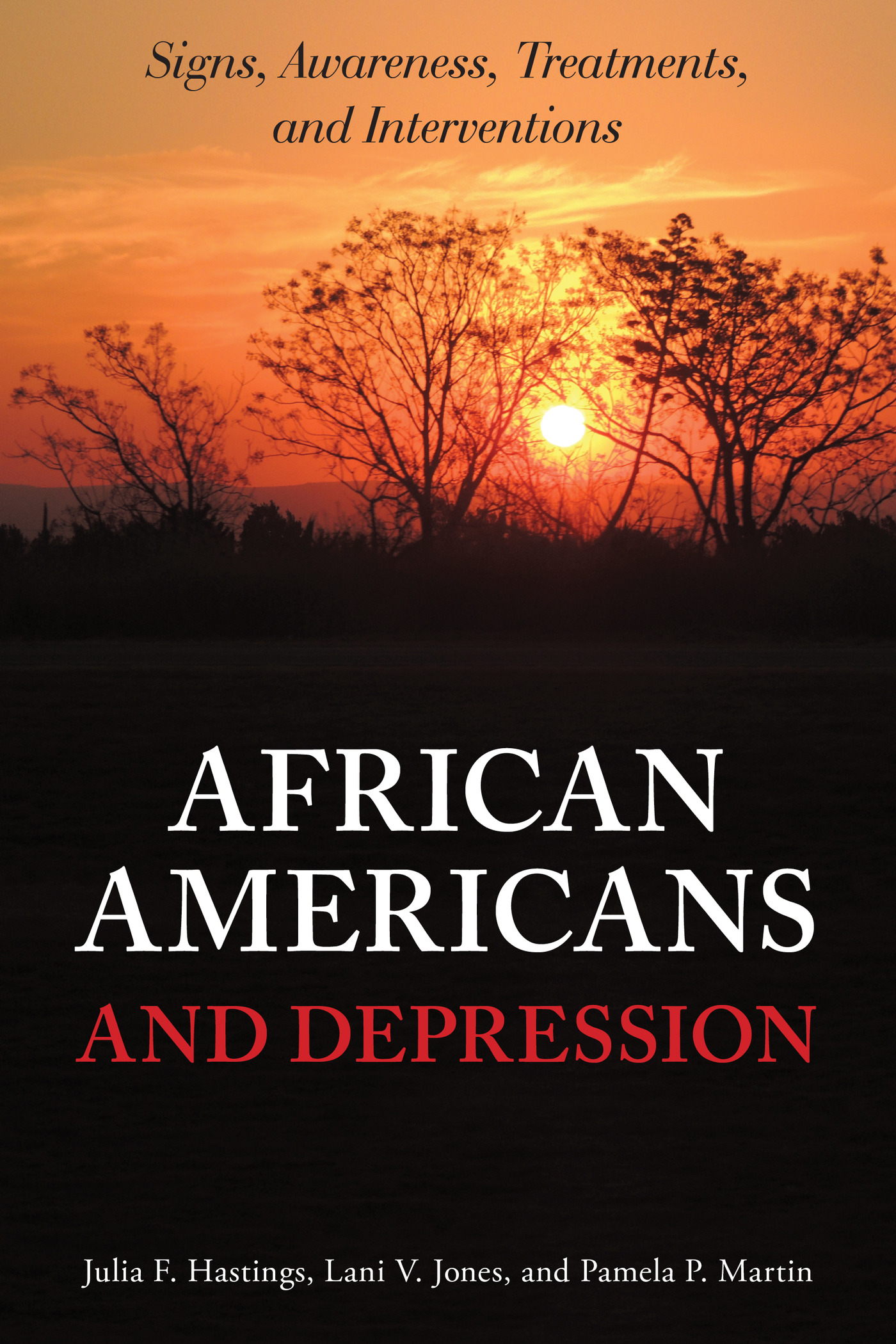African Americans and Depression
African Americans and Depression
Signs, Awareness, Treatments,
and Interventions
Julia F. Hastings, Lani V. Jones, and
Pamela P. Martin
ROWMAN & LITTLEFIELD
Lanham Boulder New York London
Published by Rowman & Littlefield
A wholly owned subsidiary of The Rowman & Littlefield Publishing Group, Inc.
4501 Forbes Boulevard, Suite 200, Lanham, Maryland 20706
www.rowman.com
Unit A, Whitacre Mews, 26-34 Stannary Street, London SE11 4AB
Copyright 2015 by Rowman & Littlefield
All rights reserved. No part of this book may be reproduced in any form or by any electronic or mechanical means, including information storage and retrieval systems, without written permission from the publisher, except by a reviewer who may quote passages in a review.
British Library Cataloguing in Publication Information Available
Library of Congress Cataloging-in-Publication Data
Hastings, Julia F. (Julia Faye), 1969- , author.
African Americans and depression : Signs, awareness, treatments, and interventions / Julia F.
Hastings, Lani V. Jones, and Pamela P. Martin.
p. cm.
Includes bibliographical references and index.
ISBN 978-1-4422-3031-6 (cloth : alk. paper) -- ISBN 978-1-4422-3032-3 (electronic)
I. Jones, Lani V. (Lani Valencia), author. II. Martin, Pamela P. (Pamela Paulette), author. III. Title.
[DNLM: 1. Depression--United States. 2. Depressive Disorder--United States. 3. African Americans--United States, 4. Community Mental Health Services--United States. 5. Health Policy--United States. WM 171.5]
RC537
616.85'27008996073--dc23
2015001363
 TM The paper used in this publication meets the minimum requirements of American National Standard for Information Sciences Permanence of Paper for Printed Library Materials, ANSI/NISO Z39.48-1992.
TM The paper used in this publication meets the minimum requirements of American National Standard for Information Sciences Permanence of Paper for Printed Library Materials, ANSI/NISO Z39.48-1992.
Printed in the United States of America
Preface
Julia F. Hastings
As African Americans, we collectively wish for good health. However, what does good health mean when good health and seeking timely information are riddled with barriers? What complexities are introduced to living a life of good health when, for some African American people, there is inescapable worry about the future? What meaning does life hold when mental illness is unrecognized because the fight to keep going demands overcoming struggle? Answers to these questions are not easy.
We, the authors, write this book to offer information about one particular mental illness causing pain and devastationclinical depression. In all its forms, depression causes many African Americans to suffer in silence because verbalizing sadness is equated with weakness in character. The strong expectation of denying every sad event continues to be a cultural norm, but the heaviness of thoughts, pains, and experiences often leads to untenable living. Given current scientific findings and social reporters, many barriers to good health for African Americans exist despite efforts to improve access to care. What can be done to shed light on this very personal condition?
A book about African Americans and depression is timely given the escalating reports of tragedy in the United States. Depression remains tied to the complex web of the greatest social challengespoverty, discrimination, declining health as we age, community unrest, addictions, and interrupted pursuits of happiness. Learning about shootings, killings, drug overdoses, and domestic violence occurrences in our communities leaves almost no escape from feeling the weight of tragedy. Being directly affected by misfortune makes coping with some of lifes events overwhelming. Seeking help from strangersmental health professionalscompounds the difficulty to maintain optimal physical health balance and good mental health.
African Americans experience the lowest life expectancy and the highest mortality rate of all racial, ethnic, and gender groups in the United States. Staggering health care inequities in all disease areas and medical services also contribute to bleak findings. When focusing on mental illness, Black Americans still face discrimination in diagnosis, facility accessibility, treatment type, length of care, and follow-up care. The medical and therapeutic disparities alone impede optimal health. Changes must be made to counter such a dismal situation. Depression is painful, isolating, and destroys lives indiscriminately.
We wish to share our knowledge, practice experiences, and research findings with those searching for a pathway to relief. Experiencing emotional lows does not mean attitude or character weakness. Being afflicted with the symptoms of depression does not mean one loses a connection with spirituality. Depressions burden impacts all of African American society from individuals to the population at large. Consequently, we believe one step in improving the mental health status of African Americans is knowledge.
This book evolved naturally over fifteen years from discussions among ourselves, the authors. Family, friends, neighbors, and colleagues around the country also inspired ideas outlining this subject matter. We quickly realized the gap between conversations on depression and its specific effects on African Americans. We rarely experienced attention to our culture and our history. Talking about depression might be viewed as a betrayal to our ancestors and, therefore, is treated as a taboo topic. Sadly, U.S. history plays a part in the pattern of blatant negligence when recognizing mental illness among African American people. Who are we to suggest weakness among a people who have survived under the harshest conditions beginning with slavery? We hope this book launches conversations outside the hushed tones of taboo. Most importantly, this work must serve to catalyze action for improved care.
African Americans and Depression is groundbreaking in that it is among the first books to be written for the general population, focusing primarily on the needs of African Americans. One pressing question is, Why complete this book now? To be truthful, there is never a really good time to write a book on this subject. Throughout American history the mental health status of African Americans has always been in question, and, according to Professor James S. Jackson, a noted researcher on Black mental health, has been used to justify slavery, enforce racial segregation, and reinforce the idea that blacks were inferior to whites. Historically, supporting the notion that African Americans experienced depression detracted from acknowledged personhood.
The book focuses primarily on the psychological and medical needs of African Americans. African Americans, historically and presently, have dealt with a series of inescapable burdens. Before, during, and after the Civil Rights Era, African Americans wrestled with notions of personhood, federal restrictions, redlining housing policies, and indescribable violence from hostile forces. Beyond dealing with everyday prejudice, communities of color were also ostracized and policed due to official laws and unofficial social practices. With such restrictions came suspicion based upon demeaning stereotypes both from popular culture and racist perceptions. Therefore, the pressures of discrimination besiege the body with high blood pressure, stress, and fear as daily life is meted out on prejudicial terms. In the mind, the constant tension from acts of racism and hostility draws the sufferer into a deeper well of depression. Sadly, because of the historical denial about mental health conditions among African Americans, messages about good mental health within a cultural schema are often difficult to sustain.
Next page









 TM The paper used in this publication meets the minimum requirements of American National Standard for Information Sciences Permanence of Paper for Printed Library Materials, ANSI/NISO Z39.48-1992.
TM The paper used in this publication meets the minimum requirements of American National Standard for Information Sciences Permanence of Paper for Printed Library Materials, ANSI/NISO Z39.48-1992.